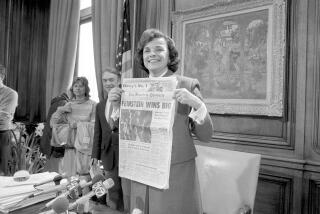Two-Career Families in Politics : Dole Resignation to Help Spouse Campaign Sets Precedent
- Share via
“History has been made,” UCLA history professor Robert Dallek said. “As far as I know, there is no precedent in America for a Cabinet officer resigning to help the campaign of her spouse.”
He was referring to the resignation earlier this week of Transportation Secretary Elizabeth Hanford Dole, who said she wanted to devote her time to campaigning for her husband, presidential hopeful Sen. Bob Dole (R-Kan.).
“What we are seeing is very significant in that it reflects directly on what is happening in society--namely the two-career household,” said Sheldon Kamieniecki, an associate professor of political science at USC.
“This is fairly new. Until recently, most wives of candidates weren’t people with separate careers. Now, often out of economic pressures just like in the case of everybody else, we are seeing two-career families in politics.”
Wide Variety of Different Jobs
Consider: Among Democratic contenders, Hattie Babbitt (wife of former Arizona Gov. Bruce Babbitt) is a partner in a Phoenix law firm; Jill Biden (wife of Sen. Joseph R. Biden Jr. of Delaware) teaches history and English at a psychiatric hospital; Kitty Dukakis (wife of Massachusetts Gov. Michael Dukakis) is director of the Public Space Partnership Program at Harvard University.
Also, Jane Gephardt (wife of Rep. Richard Gephardt of Missouri) is a former advertising manager, now a homemaker; Jackie Jackson (wife of the Rev. Jesse Jackson) is a civil rights activist.
Jeanne Simon (wife of Sen. Paul Simon of Illinois) comes the closest to Elizabeth Dole in that, after both Simons had served together in the Illinois General Assembly, she didn’t run again after they married.
Among Republicans, more of the candidates’ wives are homemakers. But Dede Robertson, wife of TV evangelist Pat Robertson, is on the Board of Regents of the Christian Broadcasting Network University.
“In the past it was accepted and expected that the role of the wife of a candidate was as a homemaker,” said John Niven, a professor of history at the Claremont Graduate School. “One exception of a sort was Eleanor Roosevelt. Although she didn’t quit any job to do so, she was active in the campaigns of Franklin.”
Dallek agreed, saying that “Eleanor was an active political animal, and helping her husband was the fulfillment of her own political aspirations.”
Presidency a Distant Dream
Kamieniecki pointed out that Jacqueline Bouvier had been a photographer for the Washington Times Herald when John F. Kennedy was a congressman but gave up the job well before his becoming President was a realistic possibility.
Another spouse of a man who eventually became chief executive gave up her career, but out of necessity.
“Lady Bird Johnson had been running the business side of their communications properties,” Dallek said. “When Lyndon became President, he put his properties into a blind trust, so she no longer held that business role.”
It isn’t out of the question that the decision by Elizabeth Dole, Kamieniecki said, might have an interesting effect:
“If she does well in supporting her husband’s campaign, even if he doesn’t get the nomination, her visibility and performance might be so good that the eventual nominee might consider her as his running mate.”
More to Read
Get the L.A. Times Politics newsletter
Deeply reported insights into legislation, politics and policy from Sacramento, Washington and beyond. In your inbox twice per week.
You may occasionally receive promotional content from the Los Angeles Times.










